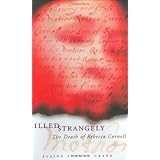
Average Reviews:

(More customer reviews)Professor Crane combines scholarly insights with an easy, narrative style and wit to make "Killed Strangely" a wonderful bridge between the academic world and that of the casual reader of historical novels. In this she joins the likes of David McCullough and Joanne Freeman to prove that history can be serious without having to be dull.
Like a good crime scene investigator, Professor Crane unravels the details surrounding the death in February, 1673 of the elderly Rebecca Cornell, very possibly (but not necessarily)at the hands of her son, Thomas. But more than investigate the elements of a crime, she uses the skelton of Cornell's death and of Thomas' indictment and trial to create an understanding of the psychology and legal processes as well as the social and familial relationships of New England's Puritans and Quakers. We especially learn a lot about women, particulary elderly women, in the seventeenth century.
At least part of an historian's role is to link the threads of history pointing out to us similarities and differences between eras. Crane traces one of those threads through the Cornell family into the nineteenth century. That raises all kinds of questions that extend beyond the scope of history into the realms of psychology, sociology and even genetics. Crane, thereby, points a flashlight into dark corners where we sometimes do not want to look. In this, she is reminiscent of "All God's Children," the account of New York's juvenile killer, Willie Bosket, and his ancestry by Fox Butterfield.
Because we are of an era that believes in guilt "beyond a shadow of a doubt," we can be left unsatisfied by Thomas' conviction and execution as were, in fact, many of his contemporaries unfortunately for, his sake, posthumously. Crane addresses this in the chapter "Doubting Thomas: Or Considering the Alternatives." Unlike a tv show, history frequently cannot be neatly wrapped up in an hour and the plot sometimes does not end satisfactorily.
But "Killed Strangely" is an easily recomended work whether you are a fan of the History Channel or Court TV --- or simply of Law and Order and CSI.
Click Here to see more reviews about: Killed Strangely: The Death of Rebecca Cornell
"It was Rebecca's son, Thomas, who first realized the victim's identity. His eyes were drawn to the victim's head, and aided by the flickering light of a candle, he 'clapt his hands and cryed out, Oh Lord, it is my mother.' James Moills, a servant of Cornell . . . described Rebecca 'lying on the floore, with fire about Her, from her Lower parts neare to the Armepits.' He recognized her only 'by her shoes.'"-from Killed StrangelyOn a winter's evening in 1673, tragedy descended on the respectable Rhode Island household of Thomas Cornell. His 73-year-old mother, Rebecca, was found close to her bedroom's large fireplace, dead and badly burned. The legal owner of the Cornells' hundred acres along Narragansett Bay, Rebecca shared her home with Thomas and his family, a servant, and a lodger. A coroner's panel initially declared her death "an Unhappie Accident," but before summer arrived, a dark web of events-rumors of domestic abuse, allusions to witchcraft, even the testimony of Rebecca's ghost through her brother-resulted in Thomas's trial for matricide. Such were the ambiguities of the case that others would be tried for the murder as well.Rebecca is a direct ancestor of Cornell University's founder, Ezra Cornell. Elaine Forman Crane tells the compelling story of Rebecca's death and its aftermath, vividly depicting the world in which she lived. That world included a legal system where jurors were expected to be familiar with the defendant and case before the trial even began. Rebecca's strange death was an event of cataclysmic proportions, affecting not only her own community, but neighboring towns as well.The documents from Thomas's trial provide a rare glimpse into seventeenth-century life. Crane writes, "Instead of the harmony and respect that sermon literature, laws, and a hierarchical/patriarchal society attempted to impose, evidence illustrates filial insolence, generational conflict, disrespect toward the elderly, power plays between mother-in-law and daughter-in-law, [and] adult dependence on (and resentment of) aging parents who clung to purse strings." Yet even at a distance of more than three hundred years, Rebecca Cornell's story is poignantly familiar. Her complaints of domestic abuse, Crane says, went largely unheeded by friends and neighbors until, at last, their complacency was shattered by her terrible death.
Click here for more information about Killed Strangely: The Death of Rebecca Cornell

0 comments:
Post a Comment